
Peel towers are small fortified keeps or tower houses, built along the English and Scottish borders in the Scottish Marches and North of England, mainly between the mid-14th century and about 1600. They were free-standing with defence being a prime consideration of their design with "confirmation of status and prestige" also playing a role. They also functioned as watch towers where signal fires could be lit by the garrison to warn of approaching danger.

Corbridge is a village in Northumberland, England, 16 miles (26 km) west of Newcastle and 4 miles (6 km) east of Hexham. Villages nearby include Halton, Acomb, Aydon and Sandhoe.
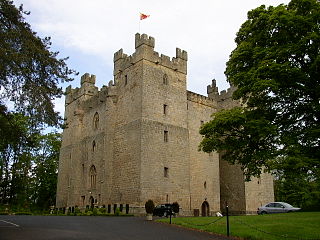
Langley or Langley-on-Tyne is a small village in Northumberland, England, located to the west of Hexham.

Bywell Castle is situated in the village of Bywell overlooking the River Tyne, four miles east of Corbridge, Northumberland, England. It is a Grade I listed building and a Scheduled Ancient Monument.

Hartburn is a village in Northumberland, in England. It is situated about 6 miles (10 km) to the west of Morpeth. The population at the 2011 census was 194.

Aydon is a village and former civil parish, now in the parish of Corbridge, in Northumberland, England. It is about 2 miles (3 km) northeast of Corbridge on the B6321 road. The village is about 18 miles (29 km) from Newcastle upon Tyne along the main A69 road. The A68 road is close by, leading to Jedburgh and Darlington. Aydon lies near the course of the ancient Roman monument, Hadrian's Wall. In 1951 the parish had a population of 90.

Belsay is a village and civil parish in Northumberland, England. The village is about 5 miles (10 km) from Ponteland on the A696, which links the village with Newcastle upon Tyne and Jedburgh. The population of the civil parish was 436 at the 2001 census, increasing to 518 at the 2011 Census.

Elsdon is a village and civil parish in the English county of Northumberland about 10 miles (16 km) to the southwest of Rothbury. The name is derived from the Old English meaning Elli's valley.
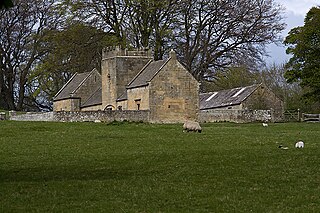
Bitchfield Tower or West Bitchfield Tower is a 15th-century medieval pele tower near Belsay, Northumberland, England. It is a Grade I listed building.
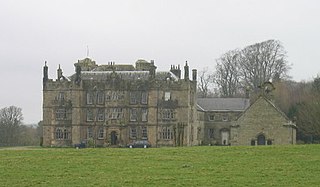
Chipchase Castle is a 17th-century Jacobean mansion incorporating a substantial 14th-century pele tower, which stands north of Hadrian's Wall, near Wark on Tyne, between Bellingham and Hexham in Northumberland, England. It is a Scheduled Ancient Monument and a Grade I listed building.

Cockle Park Tower is a Grade 1 listed building in the hamlet of Cockle Park, Northumberland, England, some 4 miles (6 km) to the north of Morpeth.
Craster Tower is an 18th-century Georgian mansion incorporating a 14th-century pele tower situated near the fishing village of Craster, Northumberland, England. It is a Grade II* listed building.

Cresswell Pele Tower is in the village of Cresswell, situated overlooking the coast approximately 4 miles (6 km) to the north of Ashington, Northumberland, England.
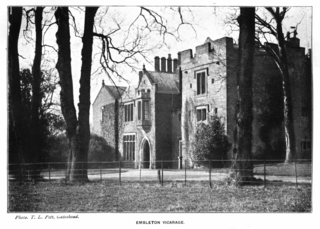
Embleton Tower is a peel tower and Grade I listed building in the village of Embleton in Northumberland, England. Tradition states that in 1395, the tower was built to protect the minister and church goers of Embleton's Church of the Holy Trinity after the village suffered from a raid by the Scots. The first vicarage was provided for the vicar of Embleton by Merton College, Oxford, who held the patronage of the parish, in 1332. According to Montagu Francis Finch Osborn (1843–1910), vicar of Embleton in 1884, vicarages were erected at three different periods; by 1416, the Vicar's Turris de Emyldon was known to exist. The present building includes a house built in about 1828 as a vicarage adjoining the tower.
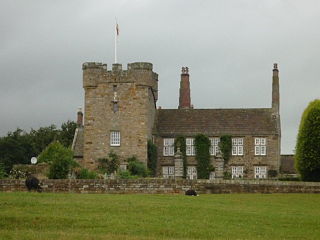
Halton Castle is a pele tower and grade I listed building situated close to Hadrian's Wall to the north of the village of Corbridge in Northumberland, England.

Powburn is a small village on the A697 in Northumberland, England about 8 miles (13 km) south of Wooler and 10 miles (16 km) northwest of Alnwick.

Halton is a village and former civil parish, now in the parish of Whittington, in the southern part of Northumberland, England. It is situated 3 miles (4.8 km) north of Corbridge just south of Hadrian's Wall. In 1951 the parish had a population of 24.

Whittingham is a village and civil parish in Northumberland, England. It is situated on the banks of the River Aln, roughly 4.5 miles (7 km) east of its source at Alnham and 7.3 miles (12 km) west of Alnwick. The thirteenth/fourteenth century pele tower, Whittingham Tower, was converted into almshouses in 1845 and is now in private ownership.

Netherwitton is a village in Northumberland, England about 8 miles (13 km) west north west of Morpeth.

Dilston Castle is an unglazed 15th-century uninhabited tower house at Dilston in the parish of Corbridge, Northumberland, England. Both are scheduled monuments and Grade I listed buildings giving them recognition for historic and architectural value as well protection from demolition.




















